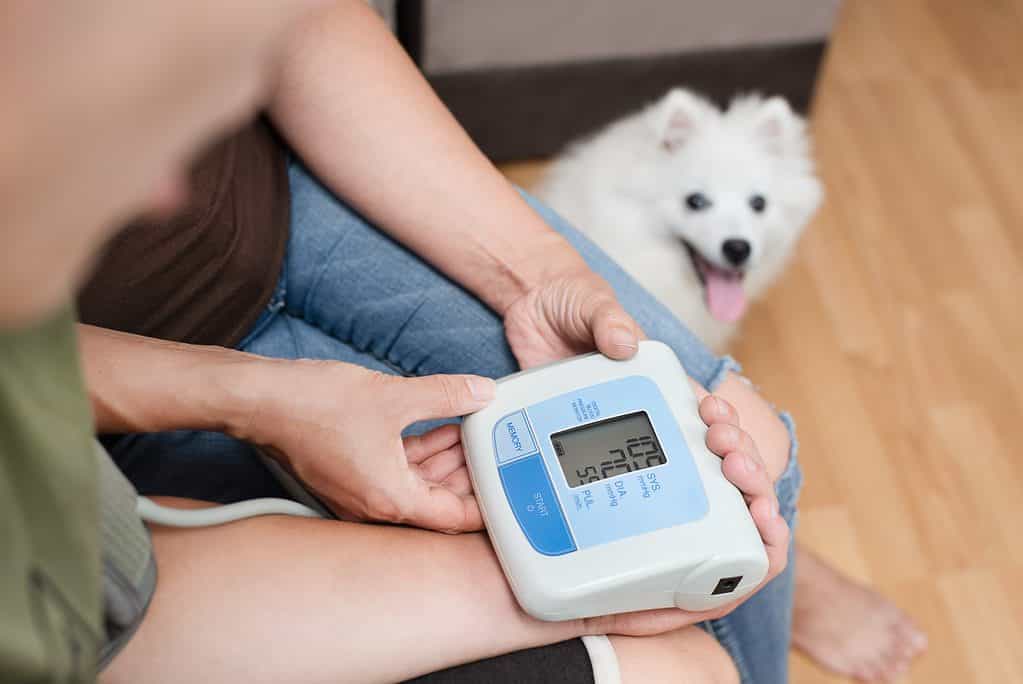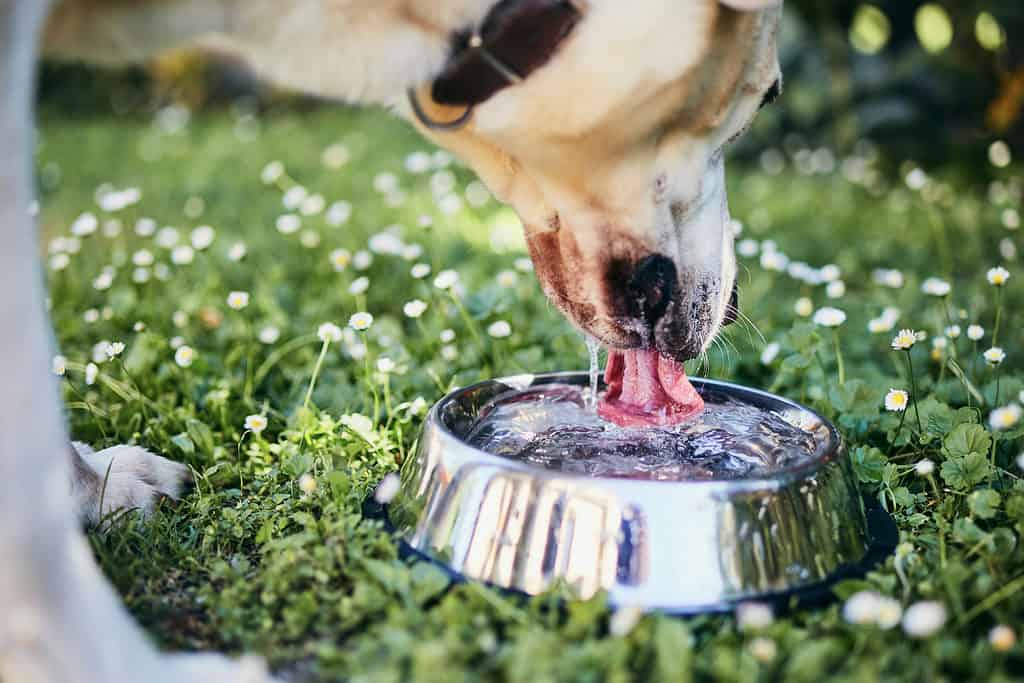Salt is an electrolyte. Therefore, dogs do need a little bit of salt in their diet. It is essential because your dog cannot function properly without it. For this reason, nutritionally complete dog foods contain a bit of salt.
However, that doesn’t mean that you should add salt to your dog’s diet. Too much salt can be just as dangerous as too little. Because dogs are smaller, they can handle much less salt than their human companions. Therefore, foods salted to human taste are often too salty for dogs.
Anytime you cook something for your dog, we recommend avoiding using spices or seasonings, like salt.
The Dangers of Too Much Salt

Salt poisoning can lead to gastrointestinal issues.
©Marian Fil/Shutterstock.com
While salt is essential in small amounts, too much salt can lead to salt toxicity. Dogs require a certain amount of salt in their diet. It helps regulate body fluids and is required for your dog’s body to function correctly.
However, if your dog overeats salt, their body will be unable to move fluids effectively. Too much salt can lead to a build-up of fluids, causing elevated blood pressure. Over time, this can lead to heart disease. Increased salt is even more dangerous if your dog is already at risk for heart disease.
If your canine consumes way too much salt, then hypernatremia can occur.
In most cases, hypernatremia occurs due to dehydration. The ratio of salt to water needs to remain balanced for your dog to function. If your dog becomes dehydrated, their normal salt levels may be too high. Often, this occurs in the winter when water dishes freeze over.
However, this condition can also occur if your dog consumes too much salt over a short period.
Salt poisoning can lead to gastrointestinal issues. For instance, vomiting and diarrhea can occur. However, as it progresses, neurological issues will develop, as the brain won’t have the proper amount of liquids. When this occurs, seizures may develop. Eventually, salt poisoning leads to death.
Luckily, salt poisoning is entirely preventable. All you need to do is prevent your dog from eating salty foods. Only very salty foods will typically cause salt poisoning, like pure salt, playdough, soy sauce, and seawater. However, any salty food can lead to salt poisoning if there is enough salt in it.
This condition is an emergency. Therefore, if you think your dog has salt poisoning, you should contact your vet immediately. It can be treated if it is caught early.
Signs of Salt Poisoning In Dogs
Salt poisoning often progresses from bad to worse quickly. While dogs can filter out excessive salt, this doesn’t occur very quickly. Dogs need a substantial amount of water to do this, and they can only consume water so fast. Therefore, as the first sign of salt poisoning, you should get your dog to the vet.
Some early signs include diarrhea, vomiting, decreased appetite, and lethargy. The symptom severity at the beginning doesn’t necessarily indicate the seriousness of the situation. Dogs can have slight symptoms and then have a seizure moments later. Early treatment is key.
Eventually, neurological signs will develop. In most cases, this occurs within minutes to hours. These signs include confusion, tremors, seizures, and excessive thirst. Eventually, the seizures become a coma, often killing the dog.
Can Dogs Eat Salty Foods?

Certain medical conditions, such as heart disease, hypertension, and
kidney disease
, require your dogs to have low salt intake.
©Masarik/Shutterstock.com
Dogs get all the salt they need from their complete diet. Therefore, you don’t need to add salt to their diet. Salty human foods can quickly raise your dog’s salt levels, which can cause problems. Luckily, most foods aren’t salty enough to cause salt poisoning.
However, even a slight excess of salt can lead to heart problems over time. Therefore, eating salty foods should not be a part of your dog’s regular routine.
With that said, if your dog does snatch a salty snack off the floor, it probably isn’t a big deal. Most foods aren’t incredibly salty, after all. Most dogs will be okay if they accidentally steal some of your snack food.
However, some dogs need a very slow salt intake. These dogs include those with heart disease, hypertension, kidney disease, and other underlying conditions. You may want to contact your vet if your dog has one of these conditions and steals a mouthful of potato chips.
What About Salt Water?

If your dog does consume salt water, it can quickly dehydrate them.
©Jaromir Chalabala/Shutterstock.com
Most people know that humans can’t drink salt water. This is because salt water contains too much salt and can lead to salt poisoning if that’s all you drink. The ratio of salt to water isn’t right.
It’s the same for our dogs. Saltwater is not safe for them, either. However, you can’t exactly explain this to a dog. Therefore, they are far more likely to drink salt water than a person. All dog owners must prevent their dogs from drinking salt water. When at the beach, bring fresh water for your dog to drink.
If your dog does consume salt water, it can quickly dehydrate them. Their intestines will contain high levels of salt, pulling water from the rest of their body. This not only dehydrates the dog but also triggers vomiting. Sadly, vomiting only increases dehydration.
You should immediately take your pet to the vet if they drink a significant amount of salt water. Your dog’s size will play a role here. Larger dogs can drink more salt water before their condition worsens. Smaller dogs may only need a few cups.
Luckily, most dogs don’t like the taste of salt water. Still, if you catch your dog drinking salt water, discourage them and provide fresh water for them to drink.
Common “Foods” That Lead to Salt Poisoning

Paintballs can also give false-positive results for antifreeze if your vet performs a blood test.
©Bork/Shutterstock.com
Beyond salty snacks and saltwater, several other foods are linked to salt poisoning due to their higher sodium content (and dogs’ willingness to eat them). These should be especially avoided.
One common cause of salt toxicity is playdough and ornaments made with playdough. Often, these products are very high in salt. However, many dogs still find these “foods” appealing. They may consume these foods in large amounts if they get access to it. Therefore, keep your playdough up where your dog can’t get it.
Another common cause of elevated salt levels is paintballs. Furthermore, paintballs can also give false-positive results for antifreeze if your vet performs a blood test. This false positive can cause your vet to treat your dog for the wrong thing. Therefore, if you know your pet ate a paintball, tell your vet.
You should be cautious with rock salt, too. Often, rock salt is used to prevent sidewalks and roads from freezing. If your dog walks on the surface, it may become stuck to their paws. Not only can this dry out their paws, but many dogs will ingest it when grooming. Because the exposure can be hours before the ingestion, this type of salt toxicity can come as a big surprise.
How To Handle Salt Toxicity in Your Dog
Dogs vary a lot. The size of your dog will determine how much salt it can eat before needing vet attention. Smaller dogs need much less salt than larger dogs for symptoms to develop. Some dogs may have underlying conditions that make them particularly prone to salt, such as hypertension. Even without symptoms, these dogs may need to see a vet after eating salty foods.
If you think your dog has consumed salty foods, take note of what the food was and when it was consumed. Check the sodium content of the food if you can. Write this down so you can give it to the vet if necessary.
You cannot cure salt toxicity by giving your dog water. Part of the issues caused by salt toxicity is that water builds up in the digestive system (where the salt is). Adding more water to the digestive system isn’t helpful. It may make the problem worse.
Instead, the fluids in your dog’s body must be rebalanced carefully. This process can only be achieved by a vet, as your dog’s blood needs to be monitored.
For this reason, if you suspect your dog has consumed too much salt, we recommend calling the pet poison control hotline or your vet. Have the information on how much salt is handy, if possible, as this will help determine if your pet needs help.
How Is Salt Toxicity Treated
If your pet is recommended to visit the hospital, your vet will probably start with a series of tests. However, if your dog is already in trouble, it may need to be stabilized first. It depends on their condition.
The test will help determine your pet’s fluid balance. It may also let the vet know how their organs are affected. Bloodwork will be necessary in most cases, but a urinalysis may also be recommended.
Pets with extreme symptoms may need other tests, like an EKG or neurological evaluation. The exact tests needed will depend on your pet’s symptoms and the results of other tests. For instance, your pet may need other tests depending on the bloodwork results.
Once the tests are run, your dog will likely be given an IV. This helps slowly reduce your dog’s sodium levels while bypassing the digestive tract. Sometimes, dogs may need oxygen therapy and electrolyte therapy to manage dehydration.
There is a significant risk of changing a dog’s fluid balance too quickly. Therefore, the process has to be done slowly. Your pet may need to remain hospitalized for a day or so while this is done. Blood tests typically need to be repeated to see how the treatment goes.
Dogs can survive salt toxicity. However, it requires treatment, preferably before neurological symptoms develop.
Up Next
The photo featured at the top of this post is © HandmadePictures/Shutterstock.com
Ready to discover the top 10 cutest dog breeds in the entire world?
How about the fastest dogs, the largest dogs and those that are -- quite frankly -- just the kindest dogs on the planet? Each day, AZ Animals sends out lists just like this to our thousands of email subscribers. And the best part? It's FREE. Join today by entering your email below.
Thank you for reading! Have some feedback for us? Contact the AZ Animals editorial team.






